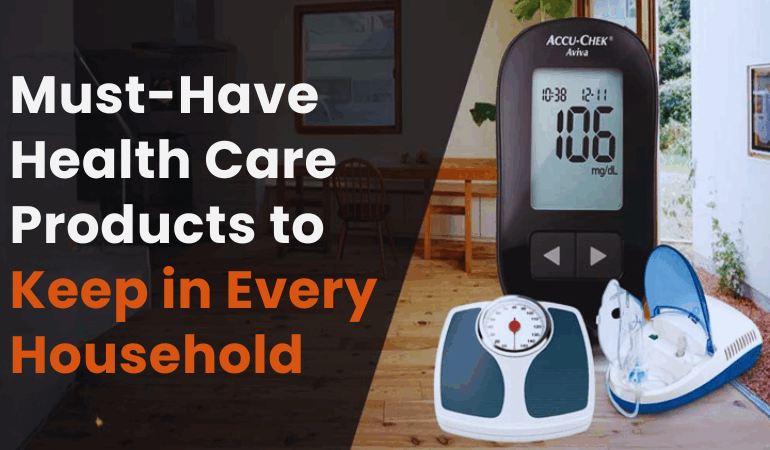Must-Have Health Care Products to Keep in Every Household

Good health starts at home, and being prepared for everyday health situations is one of the best ways to protect yourself and your loved ones. Whether it’s managing a minor cut, checking a fever, or soothing muscle aches, having the right health care products on hand can save time, reduce stress, and sometimes even prevent emergencies.
With modern lifestyles becoming more health-conscious, a well-stocked home health kit is no longer a luxury—it’s a necessity. This guide covers the essential health care products every household should consider keeping to support daily wellness and safety.
1. Digital Thermometer for Accurate Temperature Monitoring
A digital thermometer is one of the most basic yet vital tools in any home. It allows you to quickly detect fever, a common early symptom of infections. In households with children, elderly members, or anyone with a chronic illness, being able to monitor body temperature accurately is critical. Many models now offer contactless infrared options that are hygienic and quick, especially for young children or restless patients.
2. First Aid Kit for Minor Injuries and Emergencies
Every home should have a complete first aid kit stored in an easy-to-reach location. A well-equipped kit includes bandages, antiseptic wipes, adhesive tape, gauze, antibiotic ointment, and tweezers. These supplies help manage cuts, scrapes, insect bites, and other minor injuries before medical care is available. Some kits also include gloves, scissors, and a small instruction manual for handling emergency situations calmly.
3. Blood Pressure Monitor for Routine Health Checks
High blood pressure is a silent threat, often showing no symptoms until it’s too late. Having a home blood pressure monitor allows for regular checks, especially for individuals with hypertension, heart conditions, or diabetes. The latest devices are user-friendly and come with digital displays, memory tracking, and even Bluetooth connectivity to sync with health apps. Monitoring trends at home can help prevent complications and provide valuable data for health professionals.
4. Pulse Oximeter for Oxygen Level Monitoring
A pulse oximeter is a small device that clips onto your finger and measures oxygen saturation in the blood. It became a household name during the pandemic and remains relevant today. People with respiratory conditions such as asthma, COPD, or long COVID benefit from keeping a pulse oximeter at home. It’s also useful after intense workouts or during seasonal illnesses like the flu or bronchitis. Low oxygen levels can be an early sign of a serious condition that needs immediate medical attention.
5. Over-the-Counter Medications for Common Ailments
Keeping a stock of basic over-the-counter medications helps manage everyday health issues without scrambling for a late-night pharmacy run. Pain relievers such as paracetamol or ibuprofen, antacids for indigestion, antihistamines for allergies, and rehydration salts for dehydration are common staples. Always check expiration dates and store them in a cool, dry place out of children’s reach. Having these essentials ensures quick relief from minor symptoms and gives peace of mind during sudden discomfort.
6. Ice Pack and Heating Pad for Pain Relief
Cold therapy and heat therapy serve different purposes but are both incredibly helpful. An ice pack reduces inflammation, numbs pain, and helps with swelling from injuries. A heating pad soothes sore muscles, improves blood flow, and eases tension from cramps or stiffness. Keeping both items in your home allows you to address everything from minor injuries to chronic back pain with comfort and convenience.
7. Antiseptic Solutions and Hand Sanitizer for Hygiene
Maintaining hygiene is the first step toward preventing illness. Antiseptic solutions like hydrogen peroxide or chlorhexidine are effective for cleaning wounds, while hand sanitizers help control the spread of germs when soap and water aren’t available. In a post-pandemic world, maintaining a high standard of cleanliness is a household habit worth keeping. Ensuring these are part of your health care setup supports a cleaner, safer home environment.
8. Medical Gloves and Face Masks for Protection
Personal protective equipment, or PPE, is no longer reserved just for hospitals. Having disposable gloves and face masks at home is a smart precaution during flu season or while caring for sick family members. They offer protection when handling bodily fluids, cleaning wounds, or going out in high-risk areas. Stocking a small supply ensures you’re always prepared for unexpected situations without added stress.
9. Nebulizer or Steam Inhaler for Respiratory Relief
For individuals prone to respiratory issues such as asthma, seasonal allergies, or sinus infections, a nebulizer or steam inhaler can offer significant relief. A nebulizer delivers medication directly to the lungs in the form of mist, making it easier to breathe. Steam inhalers, on the other hand, help open nasal passages, ease congestion, and relax the body. Both are excellent tools to manage breathing issues right from the comfort of home.
10. Health Tracking Journal or App for Wellness Management
Tracking your health consistently helps you notice patterns, improvements, or emerging symptoms. A simple journal where you note blood pressure readings, sleep quality, mood changes, or medication timings can become a powerful tool for early detection and overall management. Digital apps are also available to automate reminders, store reports, and provide personalized health tips. Staying informed about your health empowers you to make better choices and seek help when necessary.
Conclusion: Preparedness Equals Peace of Mind
Having the right health care products at home is not just about treating illness—it’s about promoting wellness, encouraging prevention, and ensuring safety. Each of these tools plays a role in helping you respond to everyday health needs quickly and confidently. Building a home health station tailored to your family’s needs ensures that you’re prepared for whatever comes your way.
Health care doesn’t start at the clinic—it begins at home with informed choices and accessible tools. Investing in these essential products means investing in your family’s well-being and your peace of mind.